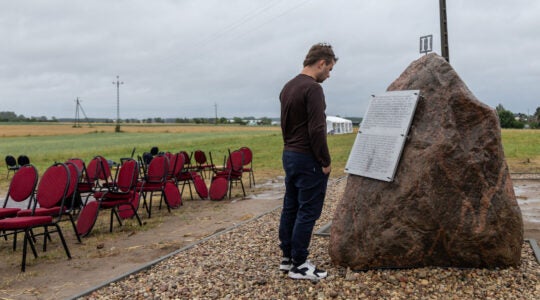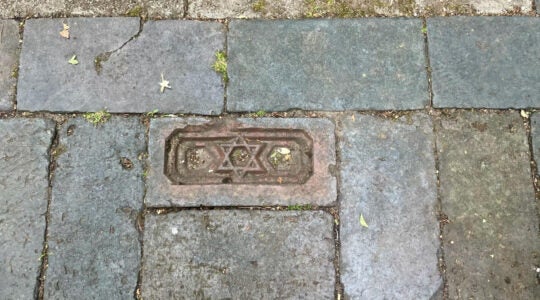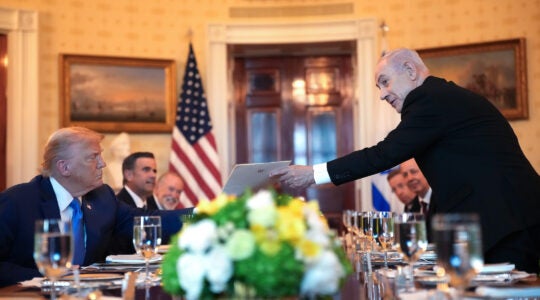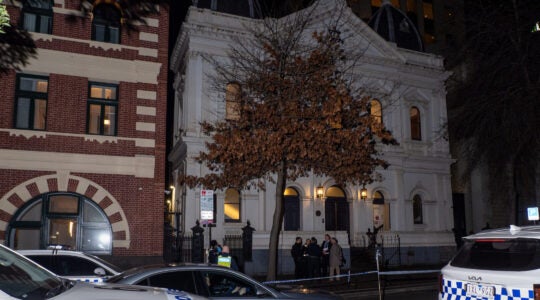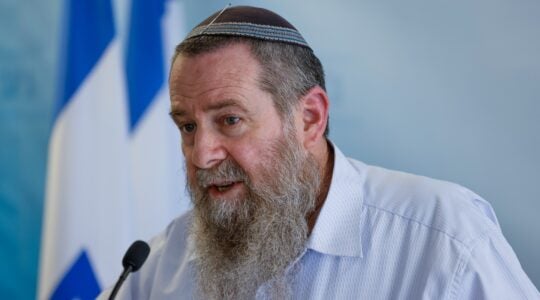NEW YORK (JTA) — In an echo of the 2007 controversy over the Latin Mass, Jewish interfaith leaders again are expressing concern that a Vatican action aimed at promoting unity within the Church may have adverse effects on Catholic-Jewish relations.
Pope Benedict XVI last week revoked an excommunication order against four bishops, followers of a Catholic faction that rejects the Second Vatican Council, which introduced reforms paving the way for improved relations with the Jewish people. The move is seen as an attempt to bring the bishops back into the Catholic fold, a development that would still be conditioned on their acceptance of the authority of Church teachings.
Among the four is the British-born Bishop Richard Williamson, who in an interview with Swedish television aired just days before the papal ruling and the Jan. 27 International Day of Remembrance of the Holocaust, doubted the accuracy of the accepted history of the Holocaust.
“I believe that the historical evidence is hugely against 6 million Jews having been deliberately gassed in gas chambers as a deliberate policy of Adolf Hitler,” Williamson said.
Williamson clarified by saying that according to the best research he’s seen, 200,000 to 300,000 Jews may have died in Nazi concentration camps, and none in gas chambers.
The pope’s move prompted the Israeli Chief Rabbinate to break its ties with the Vatican and suspended an annual interfaith meeting with Catholic leaders scheduled for March in Jerusalem. A flurry of concerned statements have poured forth from Jewish organizations, including the Anti-Defamation League, the American Jewish Committee, B’nai B’rith International and the International Jewish Commission on Interreligious Consultations, or IJCIC, the Jewish community’s main body for interfaith dialogue. The U.S. Holocaust Memorial Museum also weighed in against the move.
In their statements, the Jewish groups have generally acknowledged that the status of the bishops, members of the Society of St. Pius X, is essentially an internal Catholic matter. Their criticisms have focused mainly on Williamson and his comments about the Holocaust.
B’nai B’rith insisted that it “does not wish to insert itself into the internal processes of the diverse Catholic Church,” but said that the “latest step, coming on the eve of international Holocaust Remembrance Day, and as the reality of the Holocaust is being increasingly denied and distorted, reinforces a negative and troubling trend.”
Abraham Foxman, the ADL’s national director, was more ominous.
“This decision undermines the strong relationship between Catholics and Jews that flourished under Pope John Paul II and which Pope Benedict XVI said he would continue when he came into his Papacy,” Foxman said in a statement. “We are stunned that the Vatican has ignored our concerns by welcoming back into the fold a bishop who denies the Holocaust and rejects the seminal reforms of Vatican II.”
Seeking to tamp down the criticism, the pope, in his weekly audience at the Vatican Wednesday, affirmed his “full and unquestionable solidarity” with the Jewish people and expressed hope that the Holocaust “will induce humanity to reflect on the unpredictable power of hate when it conquers the heart of man.”
The flap echoes the concern aroused in the Jewish community when Benedict in 2007 allowed the recitation of the Latin, or Tridentine, Mass, whose Good Friday liturgy includes a prayer for Jewish conversion. Then as now, the pope’s decision was understood as an effort to reach out to the same group of traditionalists that rejected the council’s reforms.
In 2007, Benedict described the Latin Mass decision as an effort to achieve “an interior reconciliation” within the Church.
Rabbi David Rosen, the AJC’s director of interreligious affairs and the chairman of IJCIC, told JTA it is unclear whether the pope has determined that he is willing to pay a price in Jewish-Catholic harmony to achieve his unification objectives, or whether he simply has a penchant for unilateralism.
“I believe it is the second, both because some would accuse me of wishful thinking, but here there has really been a pattern of a lack of consultation,” Rosen said. “He appears to do things without understanding their full implications.”
In a letter to Cardinal Walter Kasper, the Vatican’s point person on relations with the Jewish people, Rosen requested that Williamson be asked to retract his position and apologize.
Kasper has said publicly that Williamson’s comments are “unacceptable” and Bishop Bernard Fellay, the leader of the society, said his group does not share Williamson’s view, The Associated Press reported.
In a response to Rosen on Monday, Kasper wrote that he had brought the issue to the attention of Vatican authorities.
“I am sure you will understand,” Kasper wrote, “that Bishop Williamson’s ideas do not represent the position of the Church or of the Holy See.”
JTA has documented Jewish history in real-time for over a century. Keep our journalism strong by joining us in supporting independent, award-winning reporting.
